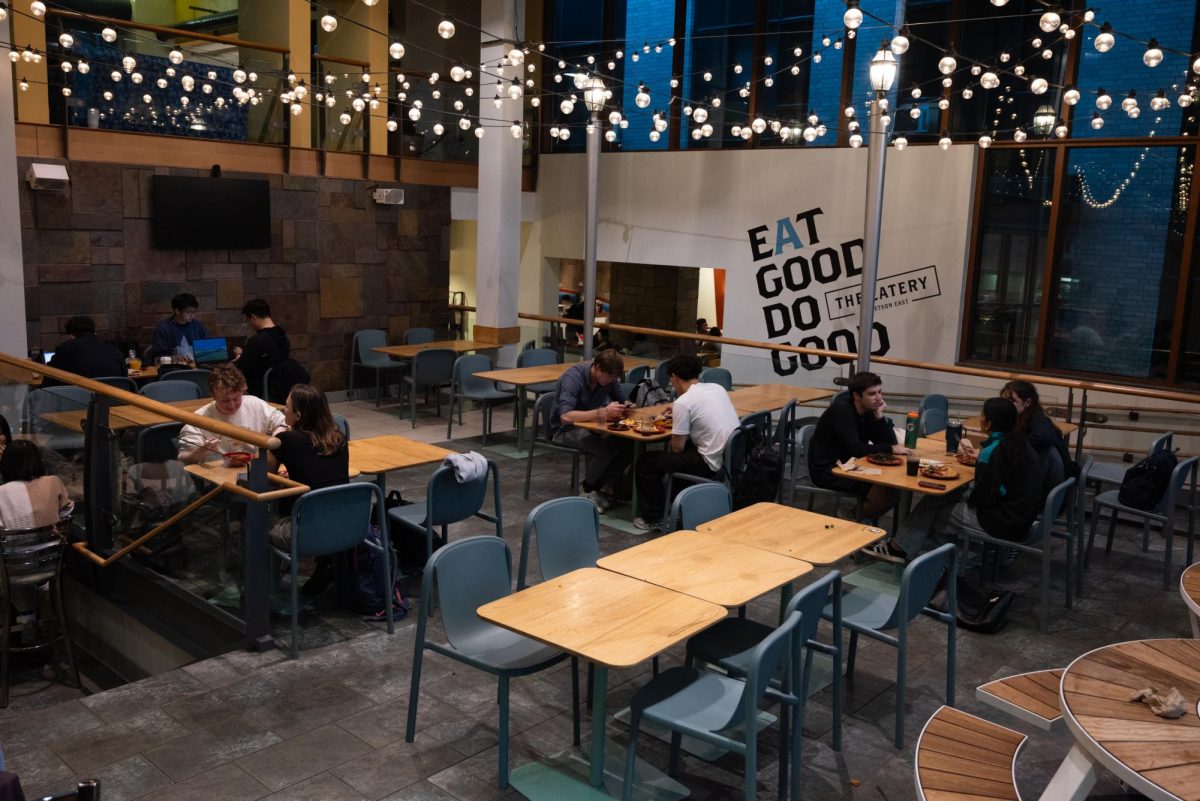Northeastern Dining says it offers a “wide assortment” of healthy and sustainable meal options, including accommodations for those with vegan, vegetarian, halal and kosher diets and foods free from the top nine allergens. But many students say a lack of assurance of allergen-free options has caused them to question the safety of the dining halls.
Many of Northeastern’s documents outlining allergen information in dining halls have disclaimers that the school cannot guarantee safety for those with dietary restrictions, The News found. For example, the Northeastern Navigating Food Allergies and Special Diets on Campus guide says that “Northeastern Dining uses manufacturer-provided ingredient information, and we do not confirm the presence or lack of an allergen.”
While it’s possible to get housing accommodations for a kitchen due to an allergy through Disability Access Services, or DAS, not all allergies qualify for this accommodation. The Dietary Disability Disclosure form from DAS says that “A diagnosis of a food allergy alone does not qualify a student for accommodations under the [Americans with Disabilities Act Amendments Act].”
For students with severe food allergies and dietary restrictions, finding safe food in the dining halls can be a trying task — and an isolating one.
“As a freshman, I didn’t know anyone else who had … food allergies and dietary restrictions for an intolerance or anything, like a severe one. I felt really isolated, even though I had friends,” said Marina Sperbeck, a fourth-year cell and molecular biology major and the president and founder of the Northeastern University Food Allergy Awareness Club. “My trouble with finding something safe to eat in the dining hall … I felt alone in that aspect. That’s what inspired me to create the Allergy Awareness Club.”
For students who need accommodations, the entire process can take months. Second-year biology major Charlotte Walborsky, who has anaphylactic reactions to peanuts and tree nuts, as well as non-anaphylactic dairy and egg allergies, first had to reach out to DAS with documentation from her allergist to begin the process of getting an accommodation for housing with a kitchen. She then spoke to the campus dietitian and waited for DAS to assess her case. Walborsky applied for an accommodation the second semester of her first year and was granted the accommodation for the next year.
Students are instructed by the allergy guide to check the ingredients for items they wish to consume on the menu. However, not all the items are labeled properly or well, said Evie Pazan, a first-year psychology major with dietary restrictions including dairy, certain meat products, nuts and sesame.
“It’s really frustrating because half of the time things have all their ingredients listed and half the time they don’t,” Pazan said.
The food allergy guide also warns that ingredients listed may be “subject to change without notification,” which means that an item that was previously safe to eat could turn unsafe without letting students know.
“In the beginning [of the year] I felt safe [in the dining halls],” Sperbeck said, who has life-threatening peanut, tree nut, milk and egg allergies. “But then after experiences where I found out [the dining hall] could change the menu items and not tell you, then I was like, ‘I really don’t think I feel safe at any station besides the allergy-free one.’”
The only fully dedicated allergy-free preparation station is Delicious Without, located in International Village’s, or IV’s, United Table, which has a separated serving and preparation station. The station is dedicated to foods without the top nine allergens: egg, milk, wheat, shellfish, fish, soy, sesame, peanut and tree nut products and gluten.
Pure Eats in The Eatery at Stetson East is a separate serving station of allergy-free foods, but there is no dedicated preparation station for food served there. “Please be mindful that all menu items served in this station are prepared and cooked using designated utensils and small wares in a shared kitchen,” reads DAS’s Dietary Disability Disclosure Form. While these measures may help minimize the risk of cross-contamination, a shared kitchen still poses risks.
Delicious Without and Pure Eats also do not offer breakfast options.
“Some days I’d be in class the whole time during [Delicious Without’s] lunch portion,” Sperbeck said, recalling her first year at Northeastern. “I couldn’t get lunch, because they don’t serve breakfast either. … So that was hard for me.”
The caveat that “menus are subject to change” can cause issues when trying to find something to eat. Students say that even when they look at the menu beforehand, there is no guarantee it will be what is being served at that dining station.
“I think the most frustrating thing is just walking up to a station with a plan of like, ‘Okay, these are the three things I can eat tonight,’ and walking up and it being something different,” Pazan said.
The prices of meal plans range from $2,700 for 100 meal swipes and $200 in dining dollars for the semester up to $4,300 for unlimited meal swipes and $400 in dining dollars. Dining plans were revamped starting fall 2024, eliminating most meal exchanges in favor of adding dining dollars.
In response to questions about students’ concerns, Northeastern’s media relations team directed The News to a November 2023 article published by university-run media outlet Northeastern Global News. The article says students with concerns or seeking accommodations for allergies should contact Northeastern Dining’s registered dietitian, Gabrielle Cabacab.
For students with food restrictions who say they’re not getting the full range of options for the same price, dining hall meals aren’t always sustainable.
“First of all, I’m not getting proper nutrition,” said Lucy Shepherd, a third-year English major who had to quit her vegan diet after her first semester at Northeastern due to the limited food options. “But second of all, I’m paying for all this food. So I’m just gonna leave [veganism] behind until I have my own kitchen.”
“Avoiding Gluten” designates products that “do not include fresh or manufactured food containing gluten.” However, legally, the dining halls cannot claim anything as “gluten-free” per the Food and Drug Administration, or FDA. The FDA requires a food item to contain less than 20 parts per million of gluten, which the dining halls cannot guarantee due to the possibility of cross-contamination.
Northeastern’s Limited Peanut and Tree Nut policy dictates that peanuts and peanut oils are not added to baked goods or menu items, but students with peanut and tree nut allergies are advised to be cautious with bakery items. Some Impossible Beef items may contain pea proteins, which can trigger allergic reactions in people with peanut allergies, according to the policy.

For students who follow a kosher or halal diet, options can also be limited. For halal students, the Spice Bowl station in IV has a dedicated halal menu, and the halal dining guide outlines other safe foods. For kosher students, the Kosher Deli is available in IV. But both stations only offer lunch and dinner, and the Kosher Deli is only open Monday through Friday.
Students said that while allergy-free in the dining halls is possible, not everyone feels safe or comfortable with the levels of assurance provided by the university.
“It’s crazy just for the amount we pay,” Shepherd said. “I think that’s the worst part of it all. We don’t have enough options, but I’m paying thousands of dollars.”
Lucy Shepherd is a copy editor at The News.
The Huntington News is dedicated to serving the Northeastern University community with original, professional reporting and creating an environment in which student journalists can learn from one another. Support an independent, free press at Northeastern University with your donation today.












